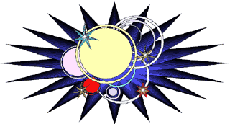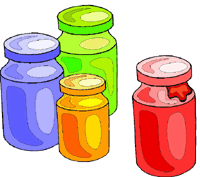Make Your Own Lava Lamp!

Art meets science, or vice versa
by Holly Hartman
Did you ever hear that "oil and water don't mix"? Here's groovy proof.

You will need:
- vegetable oil or baby oil
- water
- food coloring
- glitter, sequins, or small shiny beads
- a small, clean glass jar or bottle with a tight lid
Fill the jar about one-third full of oil. Next, sprinkle in glitter, sequins, and/or beads—a variety of sizes and colors is nice.
Pour in water almost to the top of the jar. Add a drop or two of food coloring. Then, carefully fill the rest of the jar with water. You might want to do this over a sink.
Screw the cap on the jar as tightly as you can.
Slowly turn the jar upside down, then right side up again. It's instant art! You can just enjoy the sight, or read on to learn how chemistry makes your lava lamp flow.
Molecular Magic
The proof is in your hand—oil and water don't mix. But why?
You may have heard water referred to as "H2O". H2O is the formula of the water molecule, the smallest building block of water. Molecules are made of even smaller building blocks called atoms. Every atom has an electrical charge. The charge can be positive, negative, or neutral.
This charge is the secret to how water behaves with oil. In a water molecule, the different kinds of charges are not spread out evenly. Instead, one part of the molecule has a mostly positive charge, and another part has a mostly negative charge. Molecules like this are called polar molecules. Have you heard that "opposites attract"? It's true of polar molecules. Because a positive charge is attracted to a negative charge, the positive end of one polar molecule will stick to the negative end of another polar molecule. As a result, polar molecules are good at sticking together.

In an oil molecule, however, positive and negative charges are spread out pretty evenly. Molecules like this are called nonpolar molecules. Trying to mix nonpolar molecules (like oil) with polar molecules (like water) leads nowhere. The polar molecules stick together so well that the nonpolar molecules get left out.
Two liquids that won't mix—as oil and water won't—are insoluble, or immiscible. This means that one cannot be dissolved in the other. Liquids that will mix completely are soluble, or miscible.
But why does the oil end up on top? Oil is less dense than water. A drop of water actually weighs more than a drop of oil that is exactly the same size. As a result, oil will float on top of water.
